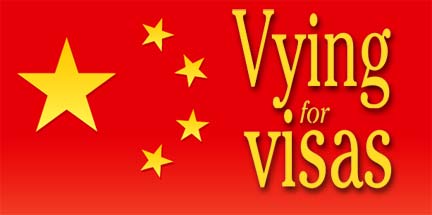CHINA-HAWAII TOURISM

A police officer keeps an eye on a crowd of visa-seekers outside the American Embassy in Beijing. A contingent of amateur vendors offering everything from snacks to advice on documentation has become a fixture along the facility's crowded sidewalks.
 |
Perceptions of distrust dim hopes
of a breakthrough solution
GUANGZHOU, China » Both Hawaii and Beijing would like to see more Chinese tourists heading to isle shores, but the age-old Chinese issue of "face" is in the way.
China has so far denied Approved Destination Status to the United States -- something it has bestowed on numerous other countries and that facilitates large-scale group leisure travel.
Travel industry insiders here say that China is willing to grant the status, but not until the United States loosens its own restrictions on visa issuance imposed after the Sept. 11, 2001, terror attacks -- seen here in China as a sign of distrust and disrespect.
"I have some people interested in going to Hawaii, but without ADS we cannot accommodate them," said He Guangrong, a Shanghai travel agent.
The United States closely vets tourist and other visa applications from China to weed out those intending to emigrate. China also is viewed now as America's top espionage threat.
Gov. Linda Lingle found herself in the middle of the standoff this week during private talks in Beijing with Shao Qiwei, head of the China National Tourism Administration.
"(Shao) was intensely eager that the governor convey the message to the feds that the U.S. has nothing to fear on the issue of economic migration," said Ted Liu, Lingle's top economic adviser.
Washington and Beijing are expected to begin preliminary talks on the impasse next month, but there appears to be little chance of a breakthrough soon.
China has complained of slow visa processing, bogged down by a new U.S. requirement that each applicant be interviewed. Hundreds are interviewed daily at U.S. consular offices in China.
"We will not budge from interviewing visa applicants," said Thurmon Borden, head of the consular affairs section at the U.S. Embassy in Beijing, said this week.
The state government has been eyeing increased tourism from China as a possible third pillar in the visitor industry to add to the Japanese and mainland U.S markets.
They point to data showing that Chinese are among the highest-spending visitors per capita in Hawaii.
"We'd like to have a mix of clientele so we aren't so dependent on any one market," said Marsha Wienert, Lingle's tourism liaison.
Securing Approved Destination Status has given a big bounce to Chinese tourist arrivals in countries with the status such as Australia and Britain.
But it remains to be seen whether Chinese tourism is a right fit for Hawaii, said Robert Char, a travel industry consultant originally from Honolulu and now based in Beijing.
"The question is, Does Hawaii want them?" he said.
"Chinese travelers are extremely price-conscious. They are willing to stay in one-, two- or even no-star hotels."
Char said Hawaii should not assume that once the Approved Destination Status impasse is worked out, an influx of Chinese visitors will fill up state coffers.
He said Chinese actually spend little on hotels, transportation and food, meaning that Hawaii relies heavily on Chinese shopping to bring in revenue for the state.
"The Chinese are very shrewd shoppers, and Hawaii has to figure out what it has that the Chinese want to buy to ensure that this type of visitor actually benefits the state economy," he said.
Short of that, it is unclear whether Chinese will want to come to Hawaii in large numbers anyway.
Hawaii competes against week-long Southeast Asian package tours sold in China including air fare, ground transportation and hotel, for as low as $250-$375.
The travel portions of such trips are operated at a loss, Char said, and tour operators only make money through kickbacks from merchants who sell cheap gemstones and other goods to the shop-aholic Chinese.
"Hawaii is very beautiful but it is too expensive, even for many rich Chinese. Why go there when we can go to Hainan (island)?" said Gao Meiling, a Shanghai attorney, referring to the subtropical Chinese island touted here as "the Hawaii of China."
Ultimately, Chinese tourism might be less likely to become a third pillar for Hawaii than a valuable little niche market, said Marvin Chang, president of Honolulu-based Dragon Travel and Tours.
But it is unlikely to reach that point until the two sides can resolve the impasse over visas and ADS.
For that to happen, U.S. congressional representatives need to work harder to drum up support from colleagues in other states, said Jeffrey Bernstein, chairman of the Shanghai American Chamber of Commerce.
The visa restrictions "are largely guided by security concerns in states that have no economic interest in increased Chinese arrivals," he said.
Yet the granting of Approved Destination Status is hardly assured.
"We're not even sure we want an ADS agreement," said the Beijing embassy's Borden. "We stand for unfettered, free travel, and ADS is a means to control it."
E-mail to City Desk
[News] [Business] [Features] [Sports] [Editorial] [Do It Electric!]
[Classified Ads] [Search] [Subscribe] [Info] [Letter to Editor]
[Feedback]
